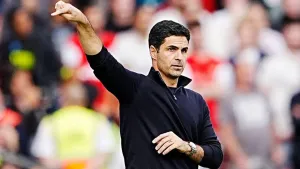Arsenal’s 1-0 defeat to Liverpool has sparked a fresh wave of tactical debate, with former Manchester United goalkeeper Peter Schmeichel voicing strong criticism over the Gunners’ conservative approach. Despite a summer of high-profile signings and heightened expectations, Arsenal’s performance at Anfield left some observers questioning whether Mikel Arteta is truly unleashing the full potential of his squad.
🧤 Schmeichel: “The Ugly Side of the Game”
Speaking after the match, Schmeichel expressed frustration at Arsenal’s reliance on set pieces and defensive structure, suggesting that their approach lacked ambition given the attacking talent at Arteta’s disposal.
“They brought the ugly side of the game,” Schmeichel said, lamenting the lack of fluid attacking play and arguing that Arsenal were too cautious in a marquee fixture.
His comments reflect a broader concern among pundits and fans alike: that Arsenal, despite investing heavily in players like Viktor Gyökeres, Eberechi Eze, and Martin Zubimendi, are not playing with the expansive style many expected.
🗣️ Walcott Fires Back: “It’s About the Plan”
Former Arsenal forward Theo Walcott was quick to respond, defending Arteta’s tactical choices and suggesting that Schmeichel’s criticism may be rooted in past frustrations—particularly Arsenal’s recent win over Manchester United.
“Well, it worked at Man United so maybe Schmeichel is a bit sour from that result,” Walcott told Mirror Football. “The plan in those games is to stay in the game… and this is the dynamic, and where I feel Mikel Arteta is at this moment in time.”
Walcott emphasized that Arteta’s strategy is situational, tailored to the opposition and the stakes of each match. While not always aesthetically pleasing, it’s a pragmatic approach aimed at securing results.
⚖️ Pragmatism vs. Philosophy
The clash of opinions between Schmeichel and Walcott underscores a familiar tension in football: the balance between style and substance. Arteta, once hailed for his progressive tactics, now appears to be leaning into a more calculated, risk-managed model—especially in high-pressure games.
Ironically, Schmeichel himself was part of Manchester United sides that often relied on similar pragmatism, using defensive solidity and set pieces to grind out results. The criticism, then, raises questions about consistency in punditry and the evolving expectations placed on modern managers.
🔍 Arteta’s Broader Vision
While Arsenal’s performance at Anfield may have disappointed some, it fits into a larger narrative of strategic evolution. Arteta is building a squad capable of adapting to different challenges, and his tactical flexibility—though divisive—is part of a long-term plan.
With the Premier League season still in its early stages and Champions League fixtures looming, Arsenal’s approach will continue to be scrutinized. Whether Arteta’s methods deliver silverware or spark further debate, one thing is clear: the Gunners are no longer just playing to entertain—they’re playing to win.




